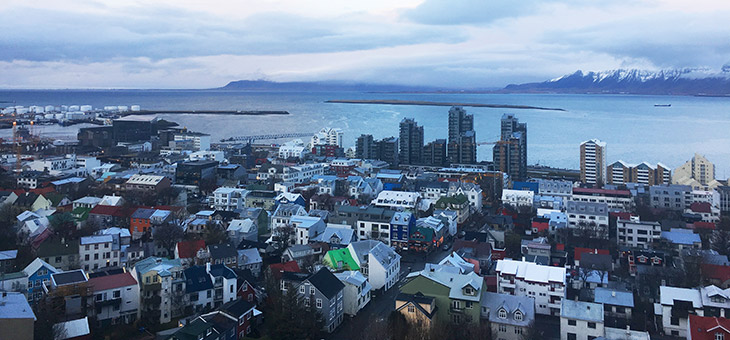Iceland is increasingly popular with travellers, but because it is so remote it still feels relatively untouched. Rachel Tyler Jones recently visited the land of the midnight sun and shares with you her tips on how to get there, when to visit, what to see and what to skip when you’re there.
•••
Getting there
One of the cheapest ways to get to Iceland is through the UK. Flights from Australia to London Heathrow often go on sale. From there, you can find flights to Reykjavik, Iceland’s capital city, for less than $100 return. It’s worth noting that these cheap flights often depart London’s smaller airports, rather than from Heathrow, so make sure you factor in time to catch the shuttle bus between the two airports. Alternatively, you may wish to explore the UK first, finishing up in Edinburgh, where flights to Reykjavik are relatively frequent and also start from under $100 return.
When to visit
Every time of year has its pros and cons in Iceland, so this one is going to depend a bit on your priorities and preferences. For the sake of simplicity, I’ll break this up into the ‘winter’ half of the year (October to March) and the ‘summer’ half of the year (April to September). If you want to see the Northern Lights, you will need to go in the winter half of the year. This is because in summer, the sun is up most of the day and night, so it never gets dark enough to see the aurora. Winter also gives you a new appreciation of the hot springs, and Reykjavik truly does become a winter wonderland once it begins to snow (usually in December). The best time to go in winter is the shoulder season. Once you get into the heart of winter, the sun stops rising, the snow gets heavier and it can become difficult to leave your accommodation, so it’s not much fun for travellers wanting to see the place.
If you decide to go in summer, you will miss the snowfall in Reykjavik, but the country will become much more accessible as a whole. The inter-city bus service stops running for the winter six months of the year, so visiting Iceland in summer means you can travel all over the country on the bus service at a very reasonable cost. You can also hire a car and safely drive about, which is not an option in winter. In short: winter is best for snow, Northern Lights and just visiting Reykjavik, while summer is best for getting out of the capital and seeing the country as a whole.
What to see
If you get the chance, seeing the Northern Lights at some point in your life is a must. You know how they seem to shimmy and move across the sky in all the videos? I always assumed that was a time-lapse, until I saw them in person. They really do shimmer and dance before your eyes.
Do take a tour of the so-called ‘golden circle’. If you can, try to book in with a smaller tour company on a mini-bus – you’ll have a more intimate experience. Finally, add a soak in one of the smaller hot springs to the end of your tour. When I first booked it seemed like it would make the day too long, but it was an unbelievably relaxing way to finish the experience, and we all fell asleep and snored our heads off on the bus ride home.
Other tips: Make sure you stop to pat the horses (they don’t like being called ponies), take the elevator to the top of the tallest building in Reykjavik and, if you get the chance, take a trip out of Reykjavik and visit the local (and free) hot springs in the mountains.
What to avoid
The Blue Lagoon is the big hot springs complex near Reykjavik. It’s very touristy, very crowded and very expensive. You’ll spend your time getting poked with other people’s selfie sticks, and wondering what’s in the people-soup in which you float. There are other much nicer hot springs you can visit that are also less expensive. I’d give it a miss, personally.
Is Iceland on your bucket list? Or is it a bit too far away (or just too bloody cold)?
Related articles:
Best sites for Northern Lights
Travelling with only hand luggage
Watch for these 2018 travel trends

